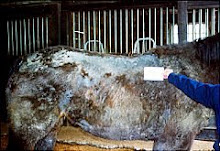May 14, 2009
DVM NEWSMAGAZINE
Lexington, Ky. -- The Kentucky Horse Racing Commission (KHRC) this week upheld the five-year suspension of a track veterinarian accused of possessing banned medications, including cobra venom.
The commission decided to adopt a hearing officer's recommendation filed April 6 stating that two suspensions totaling five years against Dr. Rodney Stewart are "legally supportable" and that "the penalties were imposed in connection with the possession of the most highly dangerous substances and serious violations of commission regulations, which represent a catastrophic threat to the safety of horses and riders."
In September 2007, racing stewards suspended Stewart four years for possession of alpha cobra toxin and one year for possession of carbidopa and levodopa. Stewart also was under other suspensions for medication labeling violations and other infractions, but those run concurrently with the five-year suspension.
The five-year total is believed to be the longest one the commission has ever imposed.
Stewart, a resident of Saratoga Springs, N.Y., had appealed on grounds of the suspensions' severity, saying he had cooperated with investigators and provided all records they requested. The suspensions prevent him from practicing at any racetrack, including New York, and from practicing on any performance animals (horses, greyhounds and camels), including in Australia where he is from.
An earlier suspension against him, dating from August 2007, was dismissed based on his cooperation with investigators by turning over some records.
At a hearing before the KHRC last December, Stewart said three vials of powdered cobra venom found in a refrigerator at a training barn at Keeneland race course in Lexington were there only by chance, packed in a case in transit on his way to New York, and that he never gave cobra venom to an active racehorse. The venom, used to deaden nerves, has limited therapeutic use in non-racing horses but is banned at racetracks. There is no test that can detect it. Stewart said in December he bought the powdered venom in 2006 from a Florida veterinary supplier and used some of it only once, to treat a retired racehorse with a sore right front foot.
http://veterinarynews.dvm360.com/dvm/Veterinary+Equine/Racetrack-veterinarians-5-year-suspension-upheld/ArticleStandard/Article/detail/598302?contextCategoryId=378&ref=25
Friday, May 15, 2009
Subscribe to:
Post Comments (Atom)

















No comments:
Post a Comment